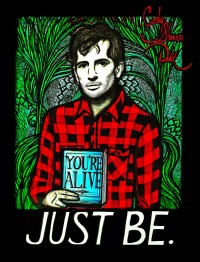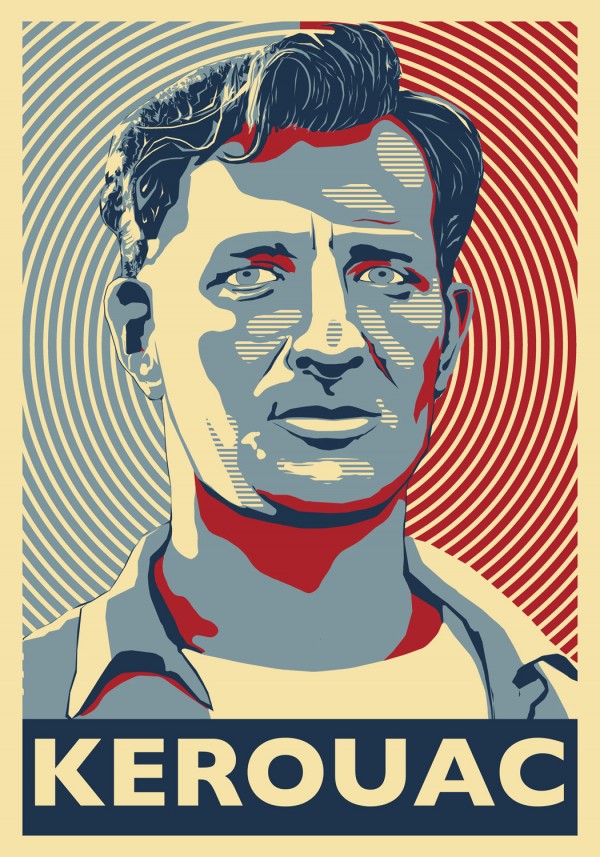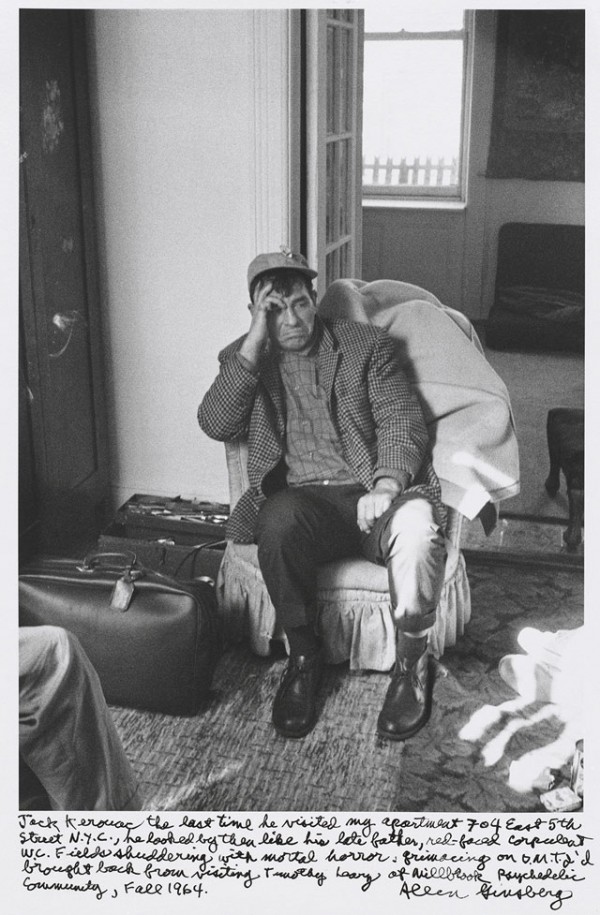SALON: From 1953 to 1963 — a period that corresponds with the publication of his most celebrated works — Allen Ginsberg snapped photographs of his cohort of soon-to-be famous friends. These shots weren’t intended for exhibition; they were mementos, thrown in the back of a drawer. He unearthed them two decades later and had copies made, in the borders of which he scrawled relevant details in felt-tip pen. It is these photographs, amended with shots from the ’80s and ’90s, that are on display at New York University’s Grey Art Gallery. […] the pictures from the ’80s and ’90s greatly enhance the emotional power of the exhibition. If it had only featured the shots from the ’50s and ’60s, we would be forgiven for thinking that everyone remains young and beautiful, that no one went bald or died. It would be hollow, telling us nothing of the reality of fame. The 20 years that separate the two sections are an eternity; no longer hungry for recognition or drunk on newfound acclaim, the Ginsberg of the ’80s has grown accustomed to being a beloved genius. But how many peers had been lost to the pressures and temptations of fame? Our last shot of Kerouac, from 1964, is harrowing; we see what that success did to him. MORE
“Jack Kerouac the last time he visited my apartment 704 East 5th Street, N.Y.C., he looked by then like his late father, red-faced corpulent W.C. Fields shuddering with mortal horror, grimacing on D.M.T. I’d brought back from visiting Timothy Leary of Millbrook Psychedelic Community, Fall 1964.” — ALLEN GINSBERG
ST. PETERSBURG TIMES, 1969: What happens to a Beatnik in the age of Aquarius?
Some, like Allen Ginsberg, accommodate to the times and become gurus, Om-ing their way from campus to campus, demonstration to demonstration.
But what of those other cult heroes of the fifties, those picturesque, picaresque, poetic wanderers of the open road, the Beats? The Corsos, the Cassadys, the Ferlinghettis?
And what of Jack Kerouac, the king of them all, the king of On the Road?
He is 46. He lives in St. Petersburg with his third wife Stella and his paralyzed mother. The house, neat concrete and brick, is his mother’s.
“I don’t go out much anymore,” he says. “I don’t really go out at all.” Nor does he particularly seek publicity.
When a photographer was assigned to get a picture of Kerouac recently, Stella answered the door and said, “He’s sick. He’ll call you when he feels better.”
He never called.
A week or so later, a reporter walked between the palms by the sidewalk and knocked on the same door. Stella, a gray-haired woman with a wide, sad smile, said “He’s not home.”
And then a face came peering over Stella’s shoulder. A face with grizzled jowls and red-rimmed eyes under spikey, dark tousled hair. Kerouac? The face said, “Yeah,” and then: “You want to come in?”
Although the sun was two hours from taking its evening dip into the gulf 10 miles to the west, the house was dim inside. A television set in the corner was on, soundless. The sound you heard was Handel’s Messiah blaring from speakers in the next room.
“I like to watch television like that,” Kerouac said.
“You ain’t going to take my photo are you? You better not try to take my photo or I’ll kick your ass.” A threatening leer, then a laugh.
“Stella. Hey! Turn the music up!” Stella went and turned the music up. Her feet were silent on the floor.
Kerouac dragged up a rocking chair for the reporter, then slumped into another one in the corner.
He was wearing unpressed brown pants, a yellow-and-brown striped sport shirt with the sleeves rolled to the elbow. The shirt was unbuttoned and beneath it the T-shirt was inside out. He pointed to his belly, large and round.
“I got a goddam hernia, you know that? My goddam belly-button is popping out. That’s why I’m dressed like this … I got no place to go, anyway. You want a beer? Hah?” He picked up a pack of Camels in a green plastic case. “Some whiskey then?”
What was he doing these days, Kerouac was asked.
“Well, I wrote that article,” he said, a trifle belligerently. His agent was busy selling a piece Kerouac had written, entitled “After Me, the Deluge,” his reflections on today’s world and what he might have contributed to it.
“Well, I’m going to write a novel about the last 10 years of my life …
He’s been living here a couple years this time; before that a while in Lowell, Mass., his hometown, and Hyannis. It’s hard to get a conventional history from Kerouac, who is bored by such commonplace matters.
“I get lonely here. I live with my mother; she’s in the back room, paralyzed. Are you writing all this down? God bless the Celts, write that down. Tell them to pronounce it like it was a K.”
He pursed his lips way out, and rolled his eyes.
“I can beat you up, that’s why I talk so tough.” Then he gave an astonishingly sheepish, little-boy grin, and said: “I hope.”
He leaned back and reached for his beer can. MORE


